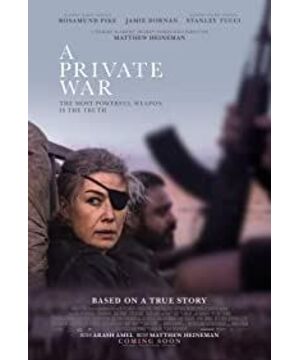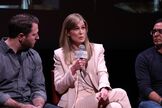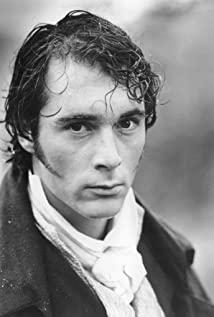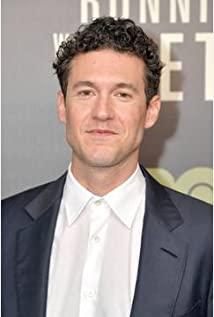This article was first published on the WeChat public account "Sour Plum Movie" and may not be reposted without permission.
Speaking of Rosamund Pike , some people may not remember who she is.
But when it comes to the suspenseful thriller "Gone Lover" directed by David Fincher , it is estimated that the audience who has watched it will inevitably have a tingling scalp.
In the film, Rosamund's Amy has a unique aura of goddess, but her paranoid and morbid character makes people stop.
Especially that nervous smile made those who came in contact with her break into a cold sweat , and she could only silently pray that such a femme fatale would stay away from her.
Although she lost to Julie Ann Moore at the Academy Awards , she still won several trophies for this role.
Rosamund, who likes Chinese culture, also gave herself a unique Chinese name- Pui Chunhua, and Chinese movie fans also affectionately call her Aunt Pei .
This year, Aunt Pei has another work nominated for the Golden Globe Award!
Although he did not beat Glenn Close's "The Wife" to win the title of Best Actress in a Drama Series, his good acting skills were still recognized by many fans!
private war
A Private War
Based on a true story, Private War is a biopic of famous war correspondent Mary Colvin .
Documenting her fate from the Sri Lankan Civil War, Iraq War, Afghanistan War, Libyan Civil War to Syria Civil War.
Mary Colvin's short, hot and plump life was vividly portrayed by Aunt Pei.
Left: Rosamund Pike; Right: Mary Colvin
By worldly standards, Mary was an ambitious strong woman.
She is brave, wise and rebellious, and is the top reporter on the international page of the newspaper.
As a senior war correspondent, Mary is also very proficient in the "unspoken rules" here.
Every time, I will be full of experience and exhort newcomers to the workplace—
Don't listen to your boss.
Don't listen to official arrangements .
Mary interviewing Civil War in Sri Lanka in 2001 .
She broke the ban, broke into the restricted area to interview , and truthfully reported the little-known disaster in the war zone.
However, on the way back, Mary was attacked by howitzers fired by Sri Lankan government soldiers.
The attack left Mary missing her left eye and deafness in her left ear.
The image of Mary "One-Eyed Woman" made everyone admire and feel distressed.
In addition to the physical damage, the disaster also left Mary with severe psychological trauma.
I have nightmares at night and can only numb myself with alcohol and cigarettes.
But her condition was getting worse and worse, and she had no choice but to be admitted to the hospital for treatment.
Aunt Pei has always been very suitable for interpreting this delicate and sensitive inner drama.
In order to play Mary's tormented, stooped walk, Aunt Pei had to keep her back bent and staggered all the time.
It is said that Aunt Pei's height has shrunk by 1.5 centimeters for the whole movie.
Director Matthew Heinemann was nominated for an Oscar for Best Documentary Feature for "Drug Land."
And the war scenes in this film also make people feel as real as a documentary.
It is also true that there are innocent people in war under the camera. Starvation, injury, and death fill their lives, and war makes people indifferent and numb.
It is well known that a war correspondent is a very great profession and a dangerous profession.
With the development of warfare in the direction of high-tech, the pace of combat has accelerated and the range of weapon attacks has become larger.
And journalists are increasingly the target of violent attacks in war.
According to the survey, during the Great Patriotic War in the former Soviet Union, 44 journalists from Izvestia died . 63 journalists were killed in the line of duty throughout the Vietnam War . In the two years before the civil war in Bosnia and Herzegovina . In the Kosovo war launched by NATO against the Yugoslavia in 1999, none of the NATO troops who were involved in the fighting was killed. In Belgrade, more than 10 journalists from the Yugoslavia were killed in the line of duty .
They are a group of people who have nothing to do with the war, but repeatedly venture deep into the war zone.
They are a group of people who have a good life, but are often brushed by death.
Just because they have lofty beliefs - if you can't stop the war, then tell the world the truth of the war .
Mary, who has not yet fully recovered from her post-traumatic stress disorder, marches into the war zone without hesitation.
This time, she came to Iraq, used a fitness card to deceive the guards' trust, and entered the non-interview war zone.
With his sensitivity to news and determination to seek the truth, he found the "mass grave" where Iraqi corpses were buried more than ten years ago.
After that, he risked being blown up and moved to Syria, where his life was on the line every day.
Facing the brutal battlefield, she kept taking pictures and writing reports.
Being in a war zone continues to exacerbate her psychological trauma every day!
However, she had no choice.
During her hospitalization, Mary said she hated war zones, but felt she had to go see it for herself and let the world see it.
She is passionate, impulsive, and full of sense of responsibility. She just wants to record the war with words, sounds, and images before she is killed by unpredictable bullets, so as to convey the truth and cruelty of war to the world.
So, when she woke up alone in the hospital bed, before she could adjust to the one-eyed life, she hurriedly looked for a notebook and a tape recorder to record the battle situation at that time.
It was obvious that she had the opportunity to evacuate from the war zone, and everyone believed that she had collected enough information, but she resolutely stayed behind and broadcasted live broadcasts to spread the most real battle situation on the scene.
When Mary's eyes were injured, someone asked her, is it worth it to give her life to interview like this?
Mary answered firmly that it was worth it !
I'm not a typical war correspondent because I focus on the humanity of war, and I want to tell people what war is really like. Centuries have passed, and warfare has not changed significantly. On the battlefield, gunfire continued to rumble, and flesh and blood were flying; wives and ions were scattered outside the battlefield; So, my job is to be a war witness.
Although the film is called "Private War", it is not a war film. It is more like Mary's struggle with her heart, the world, and the god of death.
She has been in the news reporting for thirty years on the front lines of the war with bullets. Until her death, Mary is still "war" in her own way, fighting for freedom and fighting for peace.
Many people may have such doubts in their hearts. Paying such a high price, through war reporting, can it really bring about change?
I can definitely answer you, yes, yes.
There is also a sentence in Chai Jing's "Seeing" : In this impetuous age of drifting, there are still people who sincerely give their faith.
As long as there is one person who can see the horror of war, he will infect more people and make them realize the preciousness of peace.
Everyone makes a little effort, and countless little pieces come together, which can not only change the torrent of history, but also promote the gears of the times.
In every era, there will be such brave heroes, and in every field, there will be heroes who dare to be the first.
Just like reporter Chai Jing , who dared to be the first to interview SARS patients; dared to go to the mouth of the mine where the mine accident occurred ;
Mr. Lu Xun once said - if there is no fire after this, I will be the only light .
May each of us be a warm light that changes the world.
Backstage reply to "private war", there is a source of juice~
View more about A Private War reviews











